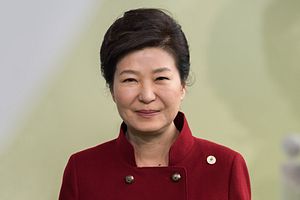North Korea has few friends in the world and it’s about to have fewer yet.
Uganda, one of Pyongyang’s few allies, announced that it will put an end to its cooperation with North Korea. The announcement came following a meeting between South Korean President Park Geun-hye and Ugandan President Yoweri Museveni.
After his meeting with Park on Sunday, Musevini announced that he’d decided that Uganda would cease its military cooperation with North Korea to comply with increasingly harsh United Nations sanctions against the country for its nuclear weapons program.
Earlier this year, the United Nations Security Council unanimously adopted resolution 2270, which put unusually harsh sanctions in place against Pyongyang. Notably, the resolution saw China acquiesce to harsher sanctions, which it had previously resisted. Resolution 2270 was adopted after North Korea conducted its fourth nuclear test in January 2016, detonating what it claimed was a hydrogen bomb.
For Uganda, however, abandoning North Korea means being able to deepen its ties with South Korea. The Wall Street Journal reports, for example, that Seoul and Kampala are looking to increase economic and defense cooperation. Reportedly, the two countries signed 10 agreements “in areas including military, rural development, health, agriculture and information and communications technology.”
A defense agreement will see South Korea and Uganda “expand cooperation in the area of military technology and training” to help “fill the void created by the disengagement of defense and police cooperation with North Korea,” according to a Ugandan foreign ministry spokesperson quoted by the Journal. For Uganda, the decision to leave North Korea behind is made more attractive by a comprehensive deepening of its ties with South Korea.
Uganda’s decision to end ties with North Korea wasn’t one taken lightly. The two countries have had a remarkably close relationship, spanning decades. Idi Amin, Uganda’s infamous dictator, established military ties in the 1970s that saw Pyongyang provide assistance for Uganda’s armed forces.
Even as Uganda has moved away from the brutality of the Cold War years, North Korean security assistance has continued. For instance, “North Korean instructors have been training Ugandan police in areas including forensic investigations, public-order management, and handling of weapons such as pistols and AK-47s,” the Journal notes.
Kim Yong-nam, the chairman on the presidium of the Supreme Peoples’ Assembly of North Korea, has regularly visited Uganda. Last year, the two countries strengthened their bilateral ties during a visit by Kim in January. In October 2014, Kim received a “hero’s welcome” in Kampala, one analyst noted.
Given the deep history between North Korea and Uganda, Musevini’s decision to substitute Seoul for Pyongyang in the country’s diplomacy speaks to both the effectiveness of the latest sanctions against North Korea and South Korea’s diplomatic outreach to Pyongyang’s few remaining allies. Last month, Park visited Iran, another state with close ties to North Korea, to seek common understanding on nuclear disarmament on the Korean peninsula.
Despite losing Uganda, North Korea continues to maintain relationships with other states on the African continent. For instance, while Park visited Uganda, Kim Yong-nam traveled to Equitorial Guinea, where he held talks with President Teodoro Obiang Nguema Mbasogo. Kim had also met leaders from Chad, Gabon, Central African Republic, and Mali, and conferred with president of Burundi and the former president of Mozambique, according to North Korean state media.

































